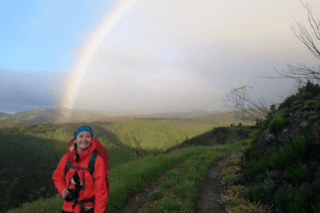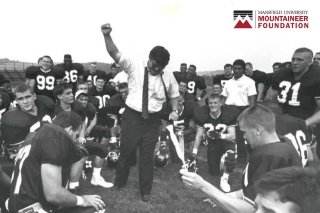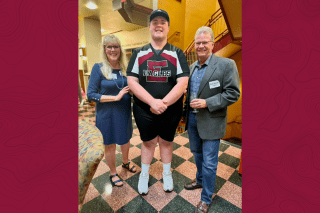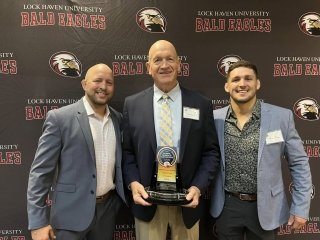Senior makes history as Fulbright Scholar
Bloomsburg
Posted

Becoming a Fulbright Scholar has been a dream of Alexandra Miller’s since high school. This summer the Bloomsburg University senior languages and cultures major will get to live her dream when she travels to Argentina as part of the Fulbright Scholar program.
“I first heard about Fulbright back in high school and it has been something I have always wanted to do,” says Miller. “I love to travel and learning languages. Last fall, Julie Vandivere, director of the Honors Program, encouraged me to apply for the program. She also offered to write a letter of recommendation.”
After thinking about what she wanted to do after graduation and what she’s passionate about Miller started the application process.
“I contacted professor Hidalgo de Jesús for the Spanish language assessment and asked her to mentor me in the process,” Miller says. “Then I reached out to professors Solange Garcia-Moll and Mykola Polyuha from the Department of Languages and Cultures, and Nathan Conroy (Director of Alumni Engagement) for additional letters of recommendation. I believe that the strength of my proposal, my language assessment and the strong letters of recommendations were very influential in the process.”
Miller, the first BU student to be a Fulbright Scholar, was naturally thrilled when she learned she was selected.
“I could’t believe my eyes when I received the email,” Miller says. “I know that this once in a lifetime opportunity that will change my life for the better and will teach me lessons few people are lucky enough to learn in a lifetime. It is always an incredibly rewarding feeling when you achieve something you have worked so hard and long on.”
A strong family support system has also helped Miller achieve this goal.
“My family’s unwavering support of me and all of my dreams has been invaluable throughout my college career,” says Miller. “After calling them, I kept rereading the email to make it wasn’t a mistake, and each time I read it, the same feeling of accomplishment washed over me.”
When Miller gets to Argentina, she wants to teach while also learning new things herself.
“I want to teach English in Argentina because helping people communicate and bridging language barriers has been a passion of mine for as long as I can remember,” Miller continued. “Also, the cultures of Argentina have always fascinated me, but I haven’t had the opportunity to absorb the culture and linguistic nuances of the country, which is known for its richness and captivating traditions. My aim is to live and work in Argentina as well as to experience first-hand these overlapping cultures. As our much younger country struggles to integrate a variety of languages and cultures, I feel like Argentina has much to teach us.”
There will also be time for some learning according to Miller. As part of Fulbright English Teaching Assistantship program, she wants to learn Argentine Sign Language during her time volunteering with the Deaf population.
“I plan to work teaching written English and reading comprehension in the English language,” says Miller. “Access to language leads to exciting opportunities. Deaf people learn English or Spanish as their second language, and it’s not always an easy process. I would love to bridge the communication gap between Spanish and English in the classroom, as well as the communication gap between written Spanish or Argentine Sign Language and written English.”
After her time away is over Miller won’t be happy just having the Fulbright on her resume.
“Upon returning from my service to Fulbright, I want to teach English as a second language, then later pursue a master’s degree in either linguistics or political science,” Miller continued. “With linguistics, I would like to become a certified interpreter from Spanish to English. I have also been interested in pursuing a master’s in political science or international relations because working abroad as an ambassador or diplomat has always been a dream of mine. My career goal overall would involve working in the legal setting, bringing equal access to communication to people who need it the most.”



